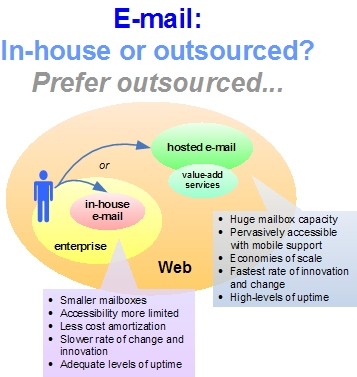The future is hosted, online e-mail

I think the ongoing discussion here on ZDNet on the subject of in-house e-mail vs. outsourcing is missing some important points so I thought I'd chime in. David Berlind originally started the discussion with some speculation about Google's e-mail hosting service with Gmail. Phil Wainwright then jumped in with some useful information about the oft-misperceived TCO of e-mail as well as identifying useful decision points to use when deciding which approach to take.
While this was all good discussion, inline with my Enterprise Web 2.0 bent, I come in as a particulary strong advocate of online, hosted software. I'll assert that well beyond the traditional concerns of cost and reliablility, the whole rules of the game of e-mail are changing. And determining the right path to take will be a challenge as these rules evolve in the Web 2.0 era.
First: E-mail as a data sink. Let's be clear that we need all of our e-mail, available anytime, anywhere. I am a voracious consumer of e-mail for my work and personal life, and most of the people I know are too. What this means is that I absolutely count on 24/7 access to my e-mail folders from wherever I happen to be. My e-mail folders, like most of us now, have become a central archive of all the conversations I've ever had, a database of all people I've had those conversations with, and a repository of every document they've ever sent me.
This is a trend that the online, hosted e-mail providers already recognize: that e-mail is becoming a sink for all the information relevant to us including e-mails, appointments, to dos, and even documents and media storage. Hosted e-mail like Gmail and Yahoo are already offering gigabytes of storage to handle this and Google even provides easy search and automatic organization of conversations while advertising that you'll never have to "throw anything away."
Second: E-mail continuing as the center of communication as new mediums sprout. The nature of e-mail itself is changing and evolving. And IT shops will have a hard time keeping up. It's not just that we want flexible, rich, roaming clients or we that store more and more things in our inbox, but that e-mail is also being used differently. Folks want to add voice, video, chat, RSS feed subscriptions and more to their e-mail systems.
Things like podcasting and the rise of video services like YouTube are just two things that are changing the perception of what's possible and expected. And the e-mail client is actually a good place to handle production and consumption of these new communication formats. But our traditional clients are increasingly falling behind in support for them. As a minor example, take the Web 2.0 vocal e-mail service, Springdoo, that allows you to send an e-mail from anywhere. Convenient and a great alternative, but not something you'll find the staid Outlook client encouraging.
If you still think your organization's e-mail staff can keep up with the pace of change and match the possibilities available in the hosted service world, just look at Justin Blanton's Gmail extensions page. Upshot: The online, hosted world is improving and evolving quickly, almost always outpacing the microcosm behind the firewall.
Third: Shortcomings of provincial e-mail systems. Then there's the constant pains of in-house e-mail that stops us from focusing on what we're actually supposed to be doing: When was the last time you had to spend an hour archiving e-mail at the request of your IT department to free up space? When was the last time your enterprise e-mail was down, or just not accessible where you were, and you had to use a Web mail service anyway? How about the last time your inbox was full because someone sent you large (but needed) files and you lost e-mails? What about the last time you had to use an application other than your corporate e-mail cient to participate in a newer communication method? Too many times I'm guessing.

Frankly, as software services on the Web become a perpetual dial-tone that we can absolutely count on from anywhere we happen to be standing, we'll find that hosted services will provide the richest, most flexible, and useful versions of our software applications. This includes e-mail in particular. I predict that the economies of scale that mega-hosters like Yahoo! and Google can apply to the problems of reliability, scalability (both in terms of bandwidth and storage), never minding ready access to innovation, will far outweigh almost any in-house proposition.
Some of you will think this position is naive in the large enterprise, but I would suggest that e-mail will continue to evolve, fragment, and be pushed online anyway for the reasons I give above. And the larger the enterprise, the harder it will be to compete with the pace of change and the demands for the same. That's not to say that a few very large organizations won't continue to achieve high levels of efficiency and cost-effectivness with their e-mail systems but it's the classic distraction problem. Organizations spend untold millions managing non-strategic IT assets and it causes them to lose crucial focus from their core missions. It the end, it makes about as much sense as maintaining your own electrical power generation facilities; you can do it, but why would you?
Yes, I know, corporate e-mail systems aren't going away any time soon. But are they become more and more irrelevant?